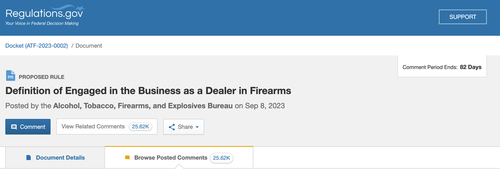
Submitted by Aidan Johnston of Gun Owners of America,
Biden and his cronies in the White House have cooked up a new unconstitutional gun control "rule" for ATF to enforce.
ATF is trying to eliminate the private sale of firearms without background checks and registration paperwork. They're essentially accusing anyone of selling a gun of being "engaged in the business" of dealing in firearms and requiring a federal gun dealer license.
ICYMI📢
— Gun Owners of America (@GunOwners) September 5, 2023
We hate to say we told you so, but it's official.
The Justice Department announced a new rule to amend ATF regulations and expand the definition of a firearms dealer to include those who sell even a single firearm. 🤯 https://t.co/HIpxe0xYv6
You might think that you'd actually have to meet some threshold of firearms sold to need a license—hit the benchmark and you're no longer just a lemonade stand on the side of the road; you've got to get a business license and obey local regulations.
Well, in 1979, ATF decided against "establishing a threshold number" on the theory that gun-owning patriots like you could simply stay below the threshold and "avoid obtaining a license...." This is a bit like saying that it would be a bad idea to post a speed limit because drivers might actually go under the speed limit.
Instead, ATF's new rule says you might not be allowed to sell even one gun to your family member without getting a government license and filling out the proper registration paperwork. Also, ATF thinks you can be engaged in the business without ever acquiring or selling a single firearm!
So, does ATF have any legal footing to stand on? Let's take a look at the statute.
The statutory definition of "engaged in the business as applied to a dealer in firearms," is:
a person who devotes time, attention, and labor to dealing in firearms as a regular course of trade or business to predominantly earn a profit through the repetitive purchase and resale of firearms, but such term shall not include a person who makes occasional sales, exchanges, or purchases of firearms for the enhancement of a personal collection or for a hobby, or who sells all or part of his personal collection of firearms.
That doesn't sound like it covers you selling a gun to your cousin at Thanksgiving, does it?
You're right! Contrary to ATF's proposed rule that a person can be engaged in the business without ever making a business deal, the statute enacted by Congress contains at least six clear indicators that more is required.
ATF is flat-out wrong when it says that "even a single firearm transaction or offer to engage in a transaction [without any actual transaction], when combined with other evidence, may be sufficient to require a license." Let's briefly prove just how wrong ATF is on each of these six counts:
1. The Statute Discusses "Firearms" in the Plural.
When writing the statute, Congress was clearly thinking about a business that sold more than one firearm (and certainly more than zero). The plural "firearms" appears repeatedly throughout the statute, so obviously dealing means more than one "firearm."
2. A "Regular Course" Is a Series of Events Demonstrating an Activity Is Occurring.
The statute clearly requires a dealer's conduct to be part of a "regular course of trade or business." This means a series of events demonstrating an overarching business purpose and mindset.
On the other hand, isolated events—like a mere offer to sell or even a single completed transaction—do not prove regularity or a course of business.
3."Repetitive" Obviously Means More than Once.
In order to be "engaged in the business," one must also engage in the "repetitive purchase and resale of firearms." Of course, repetition means more than once, that is, "the act or an instance of repeating" something. Purchases and resales must be repetitive.
For example, a gun owner who scrolls through some online ads and happens upon a great deal on a firearm (or perhaps even a group of firearms), even if he purchases and then resells that firearm with the intent to profit, still does not constitute a firearms dealer, because his activity is a one-off far from "repetitive," and certainly not a "regular course" of activity.
And that is supported by this Senate report that accompanied the passage of this statute. Congress expressly intended its "legislation to limit Federal regulation to those involved in more than isolated activities."
4. Actual Dealers Must "Purchase and Resell" Firearms.
Not to beat a dead horse, but the statute also requires the repetitive "purchase and resale of firearms." Thus, firearms must be purchased "and" resold – a far cry from the ATF claim that "there is no minimum threshold number of firearms purchased or sold that triggers the licensure requirement."
For starters, sales alone are not enough, nor are mere purchases of firearms. Both resale and purchase have to happen. And it has to be repetitive, so there must be more than one "purchase" and more than one "resale"—more than two each, in fact!
Now, ATF points to one guy they prosecuted for unlicensed dealing without any evidence of any sales having taken place. But failing to require a "resale" in addition to a "purchase" (never mind requiring each to be "repetitive") reads the word "resale" right out of the statute. Who cares what ATF did once to some guy in violation of the law while some anti-gun judge looked the other way?
5. A "Resale" Is Something More than a "Sale," and Is Done Simultaneously.
The statute does not require merely "purchases" and "sales"—something any gun owner might do. Congress actually used the word "resale"—meaning "the act of selling something again" such as "buying used cars for resale to overseas markets." Thus, embedded within the word "resale" is a requirement that firearm purchases and resales must be linked together within a short enough timeframe of each other to constitute business activity.
ATF tries to eliminate this definition of resale, essentially defining it as a sale, but Congress chose its words carefully, and ATF needs to respect that. No one would say that a collector who buys rare cars, maintains them in his garage for decades, and subsequently offers them at auction has been "buying used cars for resale to overseas markets."
Well, that's just as true for gun stores. No firearm dealer (at least none that wants to stay in business) purchases large quantities of firearms only to hold them in inventory for a long period of time, as does a firearm collector or even investor. A private collector might purchase large numbers of firearms (even of the same make and model) with the intent that they increase in long-term value, a dealer's profit incentives are much more short-term, out of necessity.
6. The Statute Exempts Non-Business "Sales, Exchanges, or Purchases" in the Plural.
The statute contains explicit exceptions – a statutory safe harbor – to being “engaged in the business” based on the “occasional sales, exchanges, or purchases of firearms for the enhancement of a personal collection or for a hobby.”
Each of these terms used in this part of the statute is plural. This means multiple sales, multiple exchanges, or multiple purchases can be made by gun owners without rising to the level of "dealing."
No one could amass a "collection" without accumulating multiple firearms, and probably getting rid of some as well. Congress was well aware that "many firearm hobbyists sell or trade firearms from their collections," and Congress never intended for ATF to start prosecuting gun owners for such private sales.
Who could have guessed it? Biden's ATF is totally overreaching this latest ATF rule. The plain text of the statute proves at least six ways that ATF's final rule is a load of crap!
Under the Administrative Procedures Act, when agencies like ATF make rules, they must first submit the rule for public comment on the Federal Register.
During this period, citizens can give their thoughts on the rule and describe their unique situations as to how it will affect them.
Please submit comments here on the Federal Register.
* * *
We'll hold the line for you in Washington. We are No Compromise. Join the Fight Now.
Submitted by Aidan Johnston of Gun Owners of America,
Biden and his cronies in the White House have cooked up a new unconstitutional gun control “rule” for ATF to enforce.
ATF is trying to eliminate the private sale of firearms without background checks and registration paperwork. They’re essentially accusing anyone of selling a gun of being “engaged in the business” of dealing in firearms and requiring a federal gun dealer license.
ICYMI📢
We hate to say we told you so, but it’s official.
The Justice Department announced a new rule to amend ATF regulations and expand the definition of a firearms dealer to include those who sell even a single firearm. 🤯 https://t.co/HIpxe0xYv6
— Gun Owners of America (@GunOwners) September 5, 2023
You might think that you’d actually have to meet some threshold of firearms sold to need a license—hit the benchmark and you’re no longer just a lemonade stand on the side of the road; you’ve got to get a business license and obey local regulations.
Well, in 1979, ATF decided against “establishing a threshold number” on the theory that gun-owning patriots like you could simply stay below the threshold and “avoid obtaining a license….” This is a bit like saying that it would be a bad idea to post a speed limit because drivers might actually go under the speed limit.
Instead, ATF’s new rule says you might not be allowed to sell even one gun to your family member without getting a government license and filling out the proper registration paperwork. Also, ATF thinks you can be engaged in the business without ever acquiring or selling a single firearm!
So, does ATF have any legal footing to stand on? Let’s take a look at the statute.
The statutory definition of “engaged in the business as applied to a dealer in firearms,” is:
a person who devotes time, attention, and labor to dealing in firearms as a regular course of trade or business to predominantly earn a profit through the repetitive purchase and resale of firearms, but such term shall not include a person who makes occasional sales, exchanges, or purchases of firearms for the enhancement of a personal collection or for a hobby, or who sells all or part of his personal collection of firearms.
That doesn’t sound like it covers you selling a gun to your cousin at Thanksgiving, does it?
You’re right! Contrary to ATF’s proposed rule that a person can be engaged in the business without ever making a business deal, the statute enacted by Congress contains at least six clear indicators that more is required.
ATF is flat-out wrong when it says that “even a single firearm transaction or offer to engage in a transaction [without any actual transaction], when combined with other evidence, may be sufficient to require a license.” Let’s briefly prove just how wrong ATF is on each of these six counts:
1. The Statute Discusses “Firearms” in the Plural.
When writing the statute, Congress was clearly thinking about a business that sold more than one firearm (and certainly more than zero). The plural “firearms” appears repeatedly throughout the statute, so obviously dealing means more than one “firearm.”
2. A “Regular Course” Is a Series of Events Demonstrating an Activity Is Occurring.
The statute clearly requires a dealer’s conduct to be part of a “regular course of trade or business.” This means a series of events demonstrating an overarching business purpose and mindset.
On the other hand, isolated events—like a mere offer to sell or even a single completed transaction—do not prove regularity or a course of business.
3.”Repetitive” Obviously Means More than Once.
In order to be “engaged in the business,” one must also engage in the “repetitive purchase and resale of firearms.” Of course, repetition means more than once, that is, “the act or an instance of repeating” something. Purchases and resales must be repetitive.
For example, a gun owner who scrolls through some online ads and happens upon a great deal on a firearm (or perhaps even a group of firearms), even if he purchases and then resells that firearm with the intent to profit, still does not constitute a firearms dealer, because his activity is a one-off far from “repetitive,” and certainly not a “regular course” of activity.
And that is supported by this Senate report that accompanied the passage of this statute. Congress expressly intended its “legislation to limit Federal regulation to those involved in more than isolated activities.”
4. Actual Dealers Must “Purchase and Resell” Firearms.
Not to beat a dead horse, but the statute also requires the repetitive “purchase and resale of firearms.” Thus, firearms must be purchased “and” resold – a far cry from the ATF claim that “there is no minimum threshold number of firearms purchased or sold that triggers the licensure requirement.”
For starters, sales alone are not enough, nor are mere purchases of firearms. Both resale and purchase have to happen. And it has to be repetitive, so there must be more than one “purchase” and more than one “resale”—more than two each, in fact!
Now, ATF points to one guy they prosecuted for unlicensed dealing without any evidence of any sales having taken place. But failing to require a “resale” in addition to a “purchase” (never mind requiring each to be “repetitive”) reads the word “resale” right out of the statute. Who cares what ATF did once to some guy in violation of the law while some anti-gun judge looked the other way?
5. A “Resale” Is Something More than a “Sale,” and Is Done Simultaneously.
The statute does not require merely “purchases” and “sales”—something any gun owner might do. Congress actually used the word “resale”—meaning “the act of selling something again” such as “buying used cars for resale to overseas markets.” Thus, embedded within the word “resale” is a requirement that firearm purchases and resales must be linked together within a short enough timeframe of each other to constitute business activity.
ATF tries to eliminate this definition of resale, essentially defining it as a sale, but Congress chose its words carefully, and ATF needs to respect that. No one would say that a collector who buys rare cars, maintains them in his garage for decades, and subsequently offers them at auction has been “buying used cars for resale to overseas markets.”
Well, that’s just as true for gun stores. No firearm dealer (at least none that wants to stay in business) purchases large quantities of firearms only to hold them in inventory for a long period of time, as does a firearm collector or even investor. A private collector might purchase large numbers of firearms (even of the same make and model) with the intent that they increase in long-term value, a dealer’s profit incentives are much more short-term, out of necessity.
6. The Statute Exempts Non-Business “Sales, Exchanges, or Purchases” in the Plural.
The statute contains explicit exceptions – a statutory safe harbor – to being “engaged in the business” based on the “occasional sales, exchanges, or purchases of firearms for the enhancement of a personal collection or for a hobby.”
Each of these terms used in this part of the statute is plural. This means multiple sales, multiple exchanges, or multiple purchases can be made by gun owners without rising to the level of “dealing.”
No one could amass a “collection” without accumulating multiple firearms, and probably getting rid of some as well. Congress was well aware that “many firearm hobbyists sell or trade firearms from their collections,” and Congress never intended for ATF to start prosecuting gun owners for such private sales.
Who could have guessed it? Biden’s ATF is totally overreaching this latest ATF rule. The plain text of the statute proves at least six ways that ATF’s final rule is a load of crap!
Under the Administrative Procedures Act, when agencies like ATF make rules, they must first submit the rule for public comment on the Federal Register.
During this period, citizens can give their thoughts on the rule and describe their unique situations as to how it will affect them.
Please submit comments here on the Federal Register.
* * *
We’ll hold the line for you in Washington. We are No Compromise. Join the Fight Now.
Loading…





